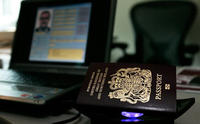-
Radiation concerns dog full-body scanners
By the end of 2014, TSA will install between 1,950 and 2,200 full-body scanners at checkpoints in all 450 commercial airports in the United States; TSA buys scanners which use two technologies — backscatter X-ray and millimeter wave; since backscatter technology raises persistent worries about radiation, some want to know why TSA should not buy only millimeter-wave scanners
-
-
DHS launches "If You See Something, Say Something" campaign for general aviation
DHS describes the campaign as a simple and effective program to raise public awareness of indicators of terrorism, crime, and other threats and emphasize the importance of reporting suspicious activity to the proper transportation and law enforcement authorities; DHS also announces new streamlined process for vetting international general aviation travel
-
-
U.S. Army to buy additional explosive disposal robots
Boeing, iRobot receive a follow-on order for 94 additional explosive disposal ground robots, bringing to total number of robots the U.S. Army has ordered to 323; the robot has the ability to perform reconnaissance during extremely hazardous explosive disposal missions involving unexploded ordnance and improvised explosive devices
-
-
Senate panels to discuss high-risk chemical facilities
This is an important week in chemical facilities security legislation, as two Senate panels are set to hold hearings on how the Environmental Protection Agency (EPA) and DHS can most effectively monitor the security measures taken by U.S. chemical facilities:
-
-
Siemens: Removing SCADA trojan may disrupt power plants
Siemens last Thursday made available to customers a tool which would detect and remove a Trojan worm infecting the company software — software used in controlling and monitoring U.S. critical infrastructure facilities and other industrial processes; trouble is, the use of the company warned customers that using the program could disrupt sensitive plant operations
-
-
Stealth overcoat hides military equipment
BAE developed “stealth coating” for military vehicles; the coating makes vehicles and equipment in the field much harder to spot not only visually, but also offers vehicles and equipment protection against detection by radar and thermal imaging devices
-
-
Sending power wirelessly through inches of steel
Submarines are made of very thick steel; this keeps them safe, but makes communication and data collection from sensors difficult; currently, 300 holes have to be drilled in a submarine hull to accommodate the sensors and communications technology the vessel requires; researchers develop a way to transmit power wirelessly through several inches of steel — which will allow submarines to communicate without an expensive hole-and-valve system; the technology will also be useful for the nuclear and oil industries
-
-
BP accused of trying to buy the silence of scientists on spill

BP is accused of trying to buy the silence of leading scientists: the company offering scientists and researchers lucrative contracts to participate in developing restoration plan for the Gulf after the oil spill — but: the scientists are not allowed to publish the research they do for the oil giant; they are also not allowed to speak about the data for at least three years or until the government gives final approval for the company’s restoration plan for the whole of the Gulf; the company would not allow scientists to take total control of the data or the freedom to make those data available to other scientists and subject to peer review; in the case of the University of South Alabama, BP offered to sign up the entire marine sciences department
-
-
Dell to replace server parts infected with virus
Dell says W32.Spybot worm was found in replacement motherboards, and that it will replace infected parts with clean motherboards; the company says it is unaware of any attacks as result of infections
-
-
The revival of CLEAR's Registered Traveler program
In 2003, Steven Brill, founder of Court TV and American Lawyer magazine, founded Verified Identity Pass and used it to launch the CLEAR program at Orlando International Airport; the program made it possible for pre-registered travelers to skip security checks at airports; the initial 8,000 travelers enrolled in 2003, and the service would grow to nearly 260,000 paying customers in a matter of five years; CLEAR went belly up in 2009, and its assets were bought by Algood Holdings, which relaunched the program; “Same brand, same logo, different company,” says CEO Caryn Seidman Becker
-
-
U.K. removes lead contractor Raytheon from e-Borders program

The U.K. hits out at Raytheon, removing the company from the £1.2 billion e-Borders program; the immigration minister Damian Green said earlier today that the program was running at least twelve months late and that Raytheon had been in breach of contract since July last year; Home Office says it has “no confidence” in the company; Raytheon was the lead contractor of the Trusted Borders consortium, which won a £650 million deal in 2007 to build the e-Borders system; other members of the consortium, including Serco, Detica, Accenture, and Qinetiq will keep their contracts; Raytheon was responsible for systems integration, travel services, and overall project management
-
-
U.S. chemical industry comes out swinging against new Senate plant security bill

Senator Frank Lautenberg (D-New Jersey) introduced a 107-page chemical plant safety bill which goes further than a similar bill — HR-2868 — approved by the House last November; Lautenberg’s bill requires the highest-risk facilities replace the most toxic and volatile chemicals they use with inherently safer technology (IST); it also set a provision, known as private right of action (PRA), which would allow citizens to file suit in federal court against DHS to force enforcement against a specific facility, and would allow private citizen petitions to DHS to demand federal investigation of suspected security shortcomings at particular sites
-
-
Dell warns of hardware trojan
Computer maker Dell is warning that some of its server motherboards have been delivered to customers carrying an unwanted extra: computer malware; it could be confirmation that the “hardware trojans” long posited by some security experts are indeed a real threat; the Pentagon is spending millions on research designed to ensure it can trust the microchips in critical systems, especially those made outside the United States
-
-
Watchkeeper surveillance drone "can see footprints through cloud"
Thales UK’s Watchkeeper surveillance UAV is fitted with radar so sensitive, according to its makers, that it can detect not only individual people moving about on the ground — but even the footprints they leave in the dirt; Watchkeeper is a modified version of the Israeli Hermes 450 with added French and British bits and pieces
-
-
Raytheon-Navy team zaps UAV targets out of the sky with laser
Four UAVs were engaged and destroyed using the Navy’s Laser Weapon System (LaWS), guided by Raytheon’s Phalanx Close-In Weapon System sensor technologies; in separate news, Boeing recently took delivery of the beam-director assembly for the U.S. Army-s High Energy Laser Technology Demonstrator (HEL TD) program, moving the system a step closer to its 2011 testing schedule
-
More headlines
The long view
Factories First: Winning the Drone War Before It Starts
Wars are won by factories before they are won on the battlefield,Martin C. Feldmann writes, noting that the United States lacks the manufacturing depth for the coming drone age. Rectifying this situation “will take far more than procurement tweaks,” Feldmann writes. “It demands a national-level, wartime-scale industrial mobilization.”
Trump Is Fast-Tracking New Coal Mines — Even When They Don’t Make Economic Sense
In Appalachian Tennessee, mines shut down and couldn’t pay their debts. Now a new one is opening under the guise of an “energy emergency.”
Smaller Nuclear Reactors Spark Renewed Interest in a Once-Shunned Energy Source
In the past two years, half the states have taken action to promote nuclear power, from creating nuclear task forces to integrating nuclear into long-term energy plans.
